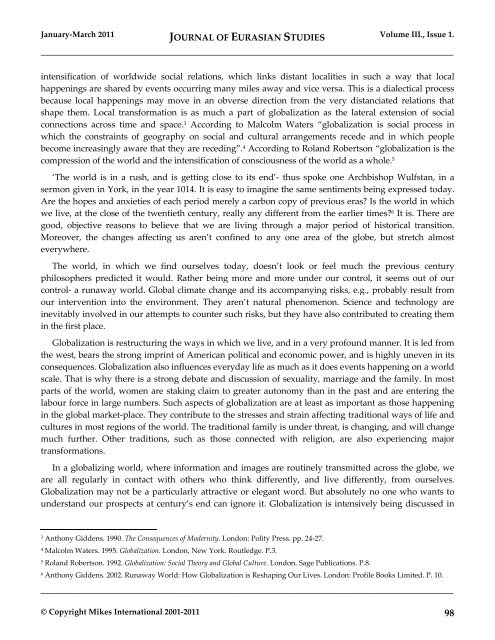JOURNAL OF EURASIAN STUDIES
JOURNAL OF EURASIAN STUDIES
JOURNAL OF EURASIAN STUDIES
Create successful ePaper yourself
Turn your PDF publications into a flip-book with our unique Google optimized e-Paper software.
January-March 2011 <strong>JOURNAL</strong> <strong>OF</strong> <strong>EURASIAN</strong> <strong>STUDIES</strong> Volume III., Issue 1.<br />
_____________________________________________________________________________________<br />
intensification of worldwide social relations, which links distant localities in such a way that local<br />
happenings are shared by events occurring many miles away and vice versa. This is a dialectical process<br />
because local happenings may move in an obverse direction from the very distanciated relations that<br />
shape them. Local transformation is as much a part of globalization as the lateral extension of social<br />
connections across time and space. 3 According to Malcolm Waters “globalization is social process in<br />
which the constraints of geography on social and cultural arrangements recede and in which people<br />
become increasingly aware that they are receding”. 4 According to Roland Robertson “globalization is the<br />
compression of the world and the intensification of consciousness of the world as a whole. 5<br />
‘The world is in a rush, and is getting close to its end’- thus spoke one Archbishop Wulfstan, in a<br />
sermon given in York, in the year 1014. It is easy to imagine the same sentiments being expressed today.<br />
Are the hopes and anxieties of each period merely a carbon copy of previous eras? Is the world in which<br />
we live, at the close of the twentieth century, really any different from the earlier times? 6 It is. There are<br />
good, objective reasons to believe that we are living through a major period of historical transition.<br />
Moreover, the changes affecting us aren’t confined to any one area of the globe, but stretch almost<br />
everywhere.<br />
The world, in which we find ourselves today, doesn’t look or feel much the previous century<br />
philosophers predicted it would. Rather being more and more under our control, it seems out of our<br />
control- a runaway world. Global climate change and its accompanying risks, e.g., probably result from<br />
our intervention into the environment. They aren’t natural phenomenon. Science and technology are<br />
inevitably involved in our attempts to counter such risks, but they have also contributed to creating them<br />
in the first place.<br />
Globalization is restructuring the ways in which we live, and in a very profound manner. It is led from<br />
the west, bears the strong imprint of American political and economic power, and is highly uneven in its<br />
consequences. Globalization also influences everyday life as much as it does events happening on a world<br />
scale. That is why there is a strong debate and discussion of sexuality, marriage and the family. In most<br />
parts of the world, women are staking claim to greater autonomy than in the past and are entering the<br />
labour force in large numbers. Such aspects of globalization are at least as important as those happening<br />
in the global market-place. They contribute to the stresses and strain affecting traditional ways of life and<br />
cultures in most regions of the world. The traditional family is under threat, is changing, and will change<br />
much further. Other traditions, such as those connected with religion, are also experiencing major<br />
transformations.<br />
In a globalizing world, where information and images are routinely transmitted across the globe, we<br />
are all regularly in contact with others who think differently, and live differently, from ourselves.<br />
Globalization may not be a particularly attractive or elegant word. But absolutely no one who wants to<br />
understand our prospects at century’s end can ignore it. Globalization is intensively being discussed in<br />
3 Anthony Giddens. 1990. The Consequences of Modernity. London: Polity Press. pp. 24-27.<br />
4 Malcolm Waters. 1995. Globalization. London, New York. Routledge. P.3.<br />
5 Roland Robertson. 1992. Globalization: Social Theory and Global Culture. London. Sage Publications. P.8.<br />
6 Anthony Giddens. 2002. Runaway World: How Globalization is Reshaping Our Lives. London: Profile Books Limited. P. 10.<br />
_____________________________________________________________________________________<br />
© Copyright Mikes International 2001-2011 98

















